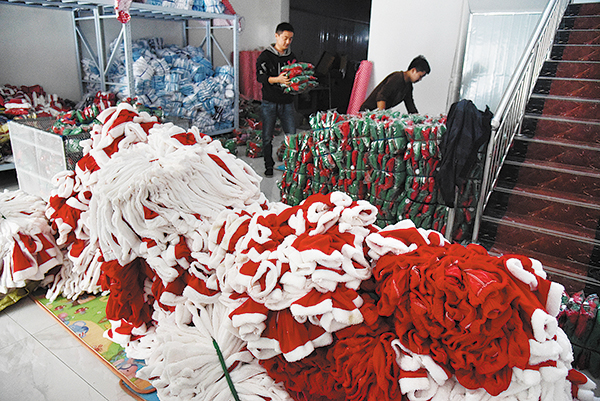Shandong village stitches together a better future online


JINAN-Sun Zhiguo is bracing for a busy month ahead. His online shop just received an order of 30,000 Santa Claus costumes from Thailand, for which his staff is working extra hours to guarantee delivery before Christmas.
"The quality of my products is second to none, and we are seeing an impressive growth of foreign orders," the 33-year-old says.
After spending seven years in Brazil selling petty commodities, Sun returned to his home village of Sunzhuang in Caoxian county of Heze city, East China's Shandong province, in 2015, when e-commerce started to boom in China's rural areas.
Inspired by relatives and neighbors, Sun initiated his garment business on Taobao, a major e-commerce site of internet giant Alibaba, committed to making quality goods and improving the livelihood of his family.
Things went unexpectedly well. In 2019, the turnover of Sun's shop reached 5 million yuan ($750,000).The business-savvy risk-taker now has his eye on Brazil's costume market, where carnivals are often celebrated with hundreds of thousands of revelers in colorful outfits.

Just a few miles away, Sun Yan was working on a sewing machine in her courtyard trying to turn her latest design into reality, with colorful cloth and elaborate accessories piled up around her.
With a passion for hanfu, a type of traditional clothing of the Han ethnic group, the 27-year-old returned to Sunzhuang village after graduating from college and established a Taobao shop in 2018 selling her own designs.
"I still remember how excited I was when I received the first order, which was from France," she recalls. Since then, several thousand of her outfits have been sold to lovers of hanfu around the world.
Loaded with successful e-commerce entrepreneurs, Sunzhuang village was designated a "Taobao village" in 2014, a title granted to villages having total annual e-commerce transactions of over 10 million yuan.
Such villages should also have more than 100 businesses, or at least 10 percent of households involved in e-commerce, as required by the title's creator Alibaba.
When the project was launched in 2009, only three villages in China met the aforementioned standards; 10 years later, the number has soared to more than 4,000, according to AliResearch, the research arm of Alibaba.
Heze city alone is now home to 307 "Taobao villages", which have, in total, 180,000 online shops and more than 570,000 employees. Over 50 e-commerce industrial parks have been established around the city, local authorities say.
Relying on its ever-growing garment business, Sunzhuang village has kept the title for six straight years, with over 70 percent of its 760 households owning a Taobao shop, according to Sun Xueping, Party chief of Sunzhuang.
In 2019, the village's total online garment sales exceeded 200 million yuan, while its market keeps expanding to more countries and regions.
The development of "Taobao villages" has helped lift many rural areas in China out of poverty by promoting agricultural products and other local specialties online.
It has also improved rural infrastructure, with local authorities able to bring new roads, broadband internet services, power supply and logistics sponsored by Alibaba.
Furthermore, says the Party chief Sun, farmers no longer have to leave their hometowns and be migrant workers in order to make more money.
"In Sunzhuang village, no single case of juvenile delinquency has been reported since 2014," he notes. "No children or elderly people are left alone at home anymore, as the development of e-commerce has created abundant local jobs."




































